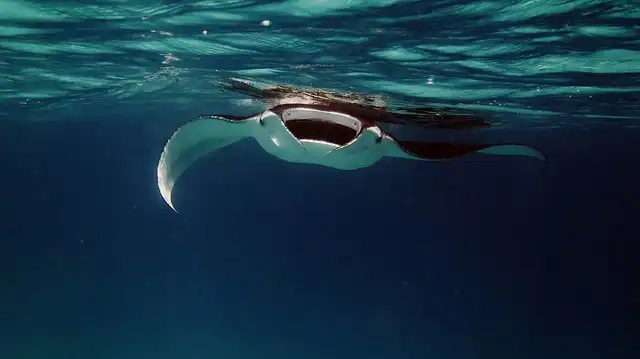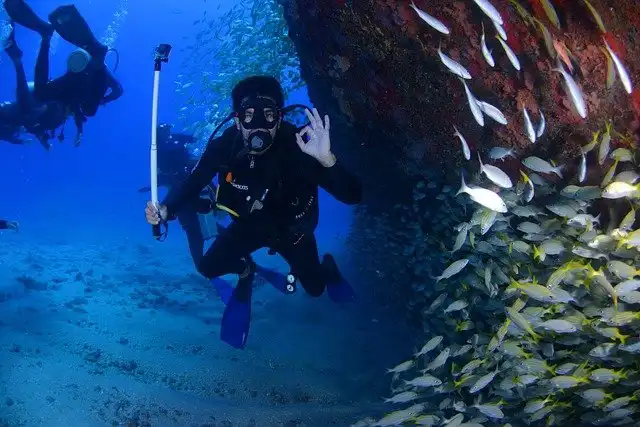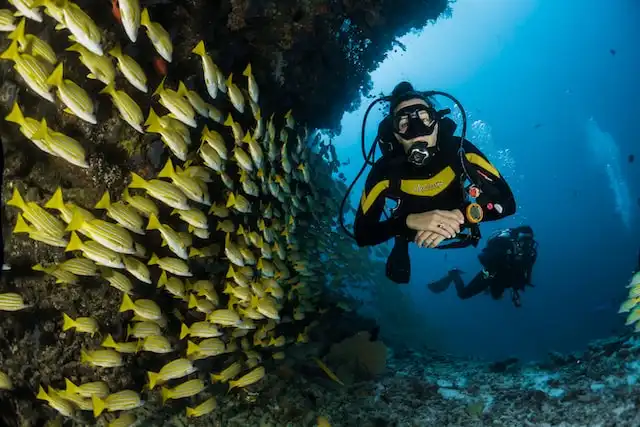Manta Point
Experience year-round encounters with graceful reef manta rays at North Male Atoll's premier cleaning station - where these gentle giants gather for essential hygiene services in crystal-clear waters
365 Days of Manta Magic
Unlike seasonal manta sites, Manta Point offers consistent year-round encounters with resident reef manta rays, making it the perfect complement to Hanifaru Bay's seasonal spectacle
The Reliable Manta Encounter
Manta Point in North Male Atoll represents one of the Maldives' most dependable manta ray encounter sites, offering year-round opportunities to witness these magnificent creatures in their natural cleaning station environment. Unlike the seasonal aggregations at Hanifaru Bay, Manta Point provides consistent encounters throughout the year.
This established cleaning station has been attracting reef manta rays for decades, creating a reliable ecosystem where small cleaner fish provide essential hygiene services to visiting mantas. The site's accessibility from Male International Airport and consistent conditions make it an ideal choice for divers and snorkelers seeking guaranteed manta encounters.
What sets Manta Point apart is its dual-season reliability - while other sites may have peak periods, this location maintains active cleaning stations year-round, supported by resident cleaner fish populations and favorable current patterns that bring nutrients and visiting mantas to the area consistently.
Manta Point Quick Facts
- Location: North Male Atoll (Kaafu Atoll)
- Distance from Male: 30-45 minutes by speedboat
- Depth Range: 6-25 meters (20-82 feet)
- Visibility: 15-30 meters (49-98 feet)
- Current: Mild to moderate
- Experience Level: All levels welcome
- Best Time: Year-round availability
- Activities: Diving and snorkeling
The Science of Cleaning Stations
Manta Point's cleaning stations represent a fascinating example of marine symbiosis, where different species benefit from mutually beneficial relationships.
Cleaner Fish Species
Symbiotic Relationship
Station Fidelity
Daily Rhythms
Manta Ray Behaviors at Cleaning Stations
Observing manta rays at cleaning stations provides insight into their complex behaviors and social interactions, creating educational and awe-inspiring encounters.

Cleaning Station Visits
Manta rays hover motionless over coral formations while cleaner fish remove parasites and dead tissue. This behavior can last 5-30 minutes per individual, providing extended viewing opportunities.
Best Viewing: Coral formations at 10-20m depth

Social Interactions
Multiple mantas often visit cleaning stations simultaneously, displaying complex social behaviors including queuing, territorial displays, and apparent communication through body language.
Best Viewing: Multiple cleaning stations during peak activity

Opportunistic Feeding
When plankton concentrations are favorable, mantas may combine cleaning visits with feeding behavior, performing graceful barrel rolls and filter feeding in the water column.
Best Viewing: Mid-water during plankton blooms

Juvenile Learning
Juvenile manta rays often accompany adults to cleaning stations, learning essential behaviors and establishing their own cleaning station preferences for future visits.
Best Viewing: Shallow areas with adult supervision
Year-Round Diving Conditions
Manta Point's year-round reliability makes it an excellent choice regardless of travel dates, with seasonal variations affecting encounter quality rather than availability.
Dry Season Peak
Best for: Optimal visibility and calm conditions
- Excellent visibility (25-30m)
- Calm surface conditions
- Predictable weather patterns
- Peak manta activity
- Ideal for photography
- Consistent cleaning station activity
Transition Periods
Best for: Balanced conditions and fewer crowds
- Good visibility (20-25m)
- Variable but manageable conditions
- Reduced tourist numbers
- Active cleaning stations
- Better value packages
- Comfortable water temperatures
Wet Season
Best for: Plankton-rich waters and feeding behavior
- Moderate visibility (15-25m)
- Increased plankton activity
- Enhanced feeding opportunities
- More dynamic manta behavior
- Fewer crowds and better prices
- Continued cleaning station use
Manta Ray Photography Guide
Manta Point offers exceptional photography opportunities with predictable subjects, good lighting, and manageable conditions for both beginners and professionals.
Cleaning Station Shots
Position yourself downcurrent from cleaning stations. Capture the interaction between mantas and cleaner fish using wide-angle lenses for context.
Natural Lighting
Utilize natural sunlight filtering through the water. Early morning and late afternoon provide the most dramatic lighting for silhouette shots.
Behavioral Photography
Focus on capturing natural behaviors rather than posed shots. Document cleaning interactions, social behaviors, and feeding activities.
Identification Shots
Capture clear belly patterns for manta identification research. These unique markings help scientists track individual mantas over time.
Access and Accommodation
Getting to Manta Point
Manta Point's location in North Male Atoll provides excellent accessibility from Male International Airport and numerous accommodation options throughout the atoll.
Access Options:
- Resort Excursions: Most North Male Atoll resorts offer regular trips
- Day Trips from Male: Multiple operators with daily departures
- Liveaboard Visits: Standard inclusion in central atolls itineraries
- Private Charters: Customized timing and duration options
Nearby Accommodations
- Luxury Resorts: Four Seasons Kuda Huraa, One&Only Reethi Rah
- Mid-Range Options: Paradise Island Resort, Kurumba Maldives
- Budget Alternatives: Male guesthouses with day trip access
- Airport Hotels: Hulhumale accommodations for easy access
Visit Requirements
- Swimming Ability: Basic swimming skills for snorkeling
- Diving Certification: Open Water minimum for diving
- Age Restrictions: Children 6+ with supervision
- Health Requirements: Standard diving medical for scuba
- Equipment: Available for rent or bring your own
Typical Costs (USD):
- Resort Excursion: $120-200 per person
- Day Trip from Male: $80-150 per person
- Snorkeling Only: $60-100 per person
- Photography Tour: $150-250 per person
- Equipment Rental: $25-40 per day
What's Included:
- Professional guide and safety briefing
- Snorkeling or diving equipment
- Boat transfers to/from site
- Light refreshments
- Marine life identification guides
Other Exceptional Sites in North Male Atoll
Combine your Manta Point experience with other outstanding dive sites in North Male Atoll for a complete Maldivian diving adventure.

Banana Reef
The Maldives' first designated dive site featuring spectacular coral formations, diverse marine life, and excellent conditions for all levels.
Depth: 5-30 meters | Level: All levels

HP Reef
Excellent thila diving with vibrant coral walls, schooling fish, and frequent shark encounters in the heart of North Male Atoll.
Depth: 8-30 meters | Level: Intermediate

Nassimo Thila
Protected marine area with pristine coral formations and excellent macro life, perfect for underwater photography enthusiasts.
Depth: 6-25 meters | Level: All levels
Conservation and Responsible Encounters
Manta Point's long-term sustainability depends on responsible tourism practices and active conservation efforts to protect these vulnerable marine giants and their cleaning station ecosystem.
🐠 Manta Ray Respect
Maintain minimum 3-meter distance from manta rays. Never touch, chase, or block their path. Allow natural approach and departure behaviors without interference.
🏊 Swimming Protocols
Move slowly and calmly in the water. Avoid sudden movements or loud noises that might disturb cleaning station activities. Follow guide instructions at all times.
📸 Photography Ethics
No flash photography near manta rays. Capture natural behaviors without manipulation. Consider contributing photos to manta identification research programs.
🌊 Environmental Protection
Use reef-safe sunscreen only. Avoid touching or standing on coral formations. Support operators with strong environmental policies and conservation programs.
Frequently Asked Questions
While Hanifaru Bay offers spectacular seasonal aggregations (May-November) with potentially 50-100+ mantas, Manta Point provides consistent year-round encounters with smaller groups (3-8 mantas typically). Manta Point allows both diving and snorkeling, while Hanifaru Bay is snorkeling-only. Both sites offer unique and complementary manta ray experiences.
Manta Point maintains approximately 80% success rate for manta encounters year-round, with higher rates during optimal conditions. The site's established cleaning stations and resident cleaner fish populations ensure consistent manta visits, though numbers and duration can vary based on conditions and timing.
Yes, Manta Point welcomes all experience levels. Snorkeling requires only basic swimming ability, while diving requires Open Water certification minimum. The site's gentle conditions and shallow cleaning stations make it ideal for beginners to experience manta ray encounters safely.
Manta rays visit cleaning stations throughout the day, but activity often peaks during mid-morning (9:00-11:00 AM) and late afternoon (3:00-5:00 PM) when cleaner fish are most active. Early morning visits often provide the calmest conditions and best visibility for photography.
Individual manta rays typically spend 5-30 minutes at cleaning stations, though some may stay longer during thorough cleaning sessions. Total excursion time is usually 2-3 hours including travel, with 45-60 minutes in the water. Multiple mantas may visit during a single session, extending encounter opportunities.
Experience Year-Round Manta Magic
Discover the reliable wonder of Manta Point, where graceful reef manta rays gather year-round at pristine cleaning stations in the crystal-clear waters of North Male Atoll.
Explore North Male Atoll